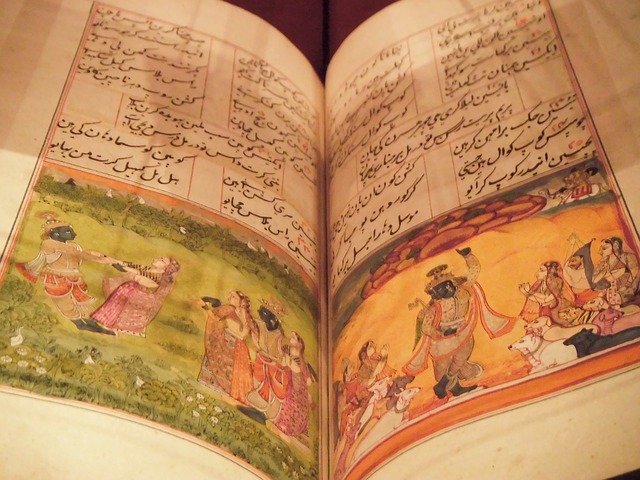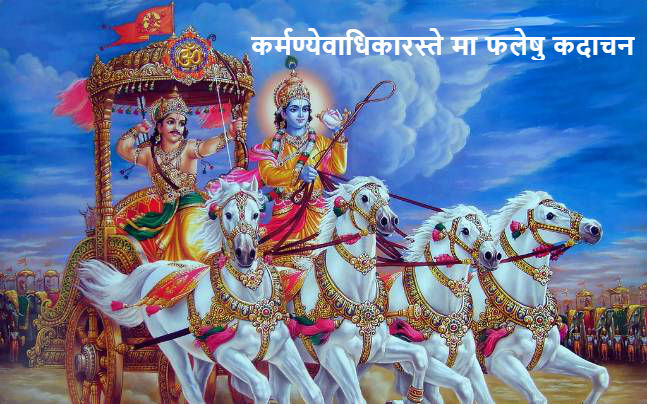UPDATED – April 2020 The most popular line in Bhagavad Gita, Karmanye Vadhikaraste is the starting line of chapter 2 verse 47 in the holy book of Hindu. Bhagavad Gita is not just a sacred book containing lots of texts but it is the tool that provides guidance and solutions to human life problems and helps widen the horizons of wisdom and get the courage to live with confidence in any part of the world. Followers of Bhagavad Gita say that if a person reads and understands a single verse from the book every day, he would stay away from all the grief and get enlightened.

This verse is taken from the Bhagavad Gita and describes the message given by Krishna to Arjuna when he was not ready to take part in the epic war of Mahabharata. Arjuna denied to fight against his own relatives like cousins, uncles and other beloved ones and said he did not want to commit a sin by killing them. Arjuna preferred being killed by them instead of killing them. At this moment, Lord Krishna delivers an important message in the form of this verse to the warrior explaining him his duty.
Krishna tells Arjuna, through this verse, that he should not worry about the result of the war. His duty was to fight and he must fight. Whether he wins or loses was not important. If he died during the war, he would go to heaven because he had performed his duty.
The idea is to make the person release himself from his mental apprehensions and make him conscious of the divinity through the work alone. The work itself is the reward, satisfaction of the job well done is the end by itself.
Karmanye Vadhikaraste Meaning

Let us understand the verse karmanye vadhikaraste meaning in more detail:
The verse in Sanskrit is:
कर्मण्येवाधिकारस्ते मा फलेषु कदाचन
English Translation:
Karmanye Vadhikaraste Ma Phaleshu Kadachana
karmanye vadhikaraste meaning:
Karmanya means In the Work or Duty Eva means Only Adhikara means Right Te means Your Ma means Not Phalesu means Fruit or result Kadachana means Ever or at any time
“You have every right to work but not expecting fruits out of it.
Do not focus on the fruits and never be inactive.”
Lord Krishna tells Arjuna that his duty was just to fight in the war and he had to fight. Whether he won or lost, he had to fulfill his duty of fighting. He did not have to worry about the results of the war, he just had to perform his duty well and leave the rest to the Almighty.
He also tells that he should never let the result be the motive behind the duty. In the context they were talking, the war was the duty and victory or defeat was the result. He should focus consistently on the action and not on the output. Your behavior should be neutral.
When Arjuna was in confusions whether he should fight or not, he told Krishna that there was no use of fighting against his own people for a piece of land. “What happiness will I get by slaying my dear ones?” he said. It was at this time that Krishna explains to him a very important lesson about his duties and the explanation became a famous verse in Mahabharata. It relates to all of the human beings in every time.
Let us understand this important verse karmanye vadhikaraste meaning in present context:
We can relate the shloka delivered by Lord Krishna to Arjuna in our life. Consider the life of a student for example. A student’s duty is to study and whether he passes or fails is not in his control. He should not study just for the purpose of passing the exams. A student learns by studying. If he passes or fails the exam, he should not be too happy or sad about it. He should be happy that he has performed his duty well.
This can be related to acts of selflessness. When we help others, we usually do it not for the sake of getting something in return. We should not be concerned whether or not we get rewarded for the good action. If we help somebody without any expectation of reward, it is called selflessness. We don’t care for what we get out from it. The important thing is that we perform our duty as a human being.
Hence, the purpose is important, not the outcome. The result is predetermined according to the purpose. In short, this verse tells us to keep performing duties without being attached to the outcomes of the actions.
- The Namagiri Thayar Mantra – For Wisdom, Creativity & Prosperity - April 29, 2024
- Krishnashtakam – “Krishnam Vande Jagadgurum” – Lyrics & Meaning - April 4, 2024
- Karadarshanam – “Karagre Vasate Lakshmi” – Meaning & Benefits - March 26, 2024


Thanks for the meaning,Can you please translate the other line as well..